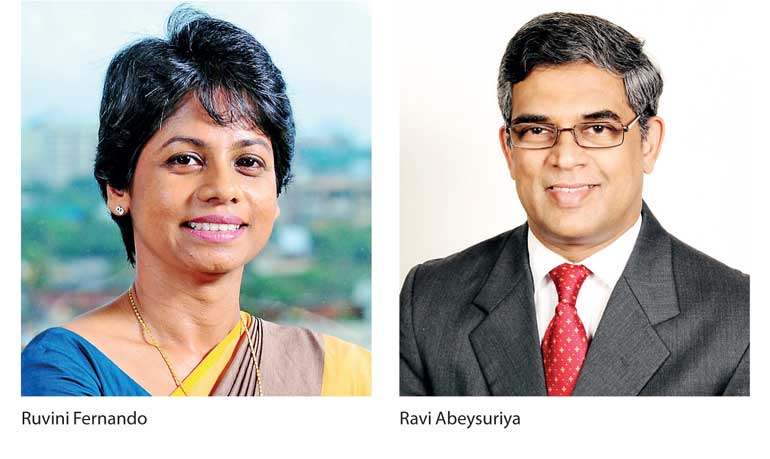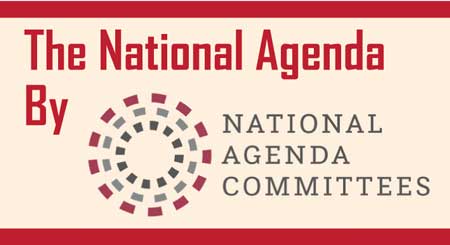Wednesday Feb 25, 2026
Wednesday Feb 25, 2026
Friday, 6 October 2017 00:00 - - {{hitsCtrl.values.hits}}
 By Shenali de Silva
By Shenali de Silva
For individual investors, knowing how to make the most of their financial assets can be a challenge given the complex nature of financial markets and investment vehicles therein. To share views on what retail investors need to be aware of when investing in Sri Lanka’s capital market, Shenali de Silva of the Economic Intelligence Unit interviewed Ruvini Fernando, formerly CEO of Guardian Acuity Asset Management Ltd.; Ravi Abeysuriya, Group CEO/Director, Candor Capital; and Nishantha Hewavithana, Head – Research and New Products at the Colombo Stock Exchange, who are members of the Ceylon Chamber of Commerce’s National Agenda Committee (NAC) on Finance and Capital.
In this first article, Ruvini Fernando and Ravi Abeysuriya discuss with Shenali De Silva what retail investors need to look at when investing in Sri Lanka. The next article will specifically explore the stock market.
At the outset of our discussion, Ruvini and Ravi observe that creating awareness about non-traditional investment opportunities for the public is critical when democratising capital markets. While there is a considerable awareness about the stock market, individual investors tend to rely on savings accounts and current accounts, given the lack of knowledge in availability of other investment vehicles.
Money market funds are a good alternative to current and savings accounts for short term investments
Both Ruvini and Ravi state that money market funds are a good alternative to parking money in savings accounts. Instruments such as unit trusts in particular are attractive and are a flexible option as they are open ended investment which permit issuing and redemption of shares at any given time.
Ruvini: “All our unit trusts are open-ended, which means there’s daily liquidity available, there’s daily redemption is possible. We invest in a large cross section of money market instruments which give much better returns. For example securitisation, and commercial papers, we do a selection of finance company deposits and other instruments which are suitable for short term investments so many of the money market funds give 11-12% return which is a very good option to keep your money instead of lying in a savings account.”
Ravi: “Money market instruments which are attractive instruments, which are offered by Unit Trusts provide a better yield. Up to now have not gone bust and this is as flexible as savings accounts.”
Ruvini believes that interest rates are likely to come down as the country’s economy develops, budget constraints lessen, and the Balance of Payments reduces. Therefore, seeking out alternative investments to interest-bearing instruments would be essential to maintaining a good lifestyle.
Ruvini: “So when it comes to long term savings like retirement plans and people saving up for their retirement, it’s not going to be enough for them to put their money in a bank deposit, and accumulate interest at 7-8%. Because inflation is also catching up, and when you retire you want an adequate pool of money to maintain a good lifestyle. With the interest rate shift downwards, you will have cycles where it’s up and coming down. But the overall trend is downwards. So it’s really essential for you to maintain your wealth to seek out these alternatives.”
Ravi: “Corporate debt going forward (listed debt), could be an opportunity, because ultimately for corporates, it is cheaper to borrow from the listed debt market than go to banks to borrow, they will have to pay a slightly higher premium to overcome the tax. I strongly urge people who have long term money, to look at listed debt going forward.”
Furthermore, while real estate is an attractive investment for corporates and high net worth individuals, investment vehicles such as Real Estate Investment Trusts (REITs) provide a platform for retail investors to capitalise on a bourgeoning real estate market. REITs are currently not operational in Sri Lanka, but are likely to be introduced following amendments to the Securities and Exchange Act.
Ravi: “In the future we’re looking at REITs, which will give retail investors who don’t have land or large amounts of capital to invest in apartments the opportunity to this. It is one area a lot of growth is likely to happen.”
Seeking out the assistance of fund manages is beneficial when investing in the long term investments such as government securities. Not only do fund managers conduct an in-depth analysis of the market and make decisions based on interest rates, they also assist with diversification of assets and are particularly helpful when assessing the health of financial companies to ensure drastic losses aren’t made.
Ruvini: “The Fund Manager’s intermediation helps them (investors) to evaluate the fund. They can help to balance a little risk with return because sometimes when you want to get a higher yield you would want to go into a somewhat risky finance company; and that’s okay, because you’re scrutinising it very carefully. And if you see any weaknesses coming in, the fund manager will make sure you exit well in time before something happens.”
Overall both Ravi and Ruvini emphasise the need for individual investors to constantly gather knowledge and conduct extensive due diligence prior to investing in both the long term and the short term.
Ruvini observes that when investing in the stock market, retail investors need to be particularly cautious of the underlying drivers of the performance of the stocks and the importance of investing at opportune moments when the markets are low. (Part 2 of the series will discuss investing in the stock market in more detail).
Ruvini: “When its stock market investing I think they have to be very careful, because the stock market is very sentiment-driven and momentum-driven. If you start investing without understanding the quality of the company and what is driving the share price, and invest in today’s best bet, you may even win a couple of times. People have a tendency of saying that the stock market is like a casino. If you don’t do your diligence then you really are playing the casino. You should do less of that and really study the companies.”
Ravi states that individual investors should be treat their investment with utmost care. Utilising the findings of credit rating agencies such as Fitch Ratings can help when assessing the health of long term investments.
Ravi: “It is imperative to check credit ratings before you invest in any fixed income instrument. When you’re investing, it’s your hard earned money you are parting with. You have to do your due diligence. When you’re sick, you seek out the best medical specialist, but I don’t see that happening when investing their hard earned money.”
Furthermore, planning ahead is of vital importance observes Ruvini, emphasising the importance of early investing. Inflation, exchange rates future expenses, rising healthcare costs all need to be factored in, in order to enjoy a comfortable lifestyle.
(‘The National Agenda’ is the Ceylon Chamber of Commerce’s knowledge platform featuring insights from members of its National Agenda Committees on Infrastructure, Energy, Logistics and Transport, Innovation, and Finance and Capital. Visit nationalagendacommittees.wordpress.com).